The State of AI in Marketing: 2025 Survey Results
Posted on May 19, 2025 by Jennifer Lee
TL;DR #
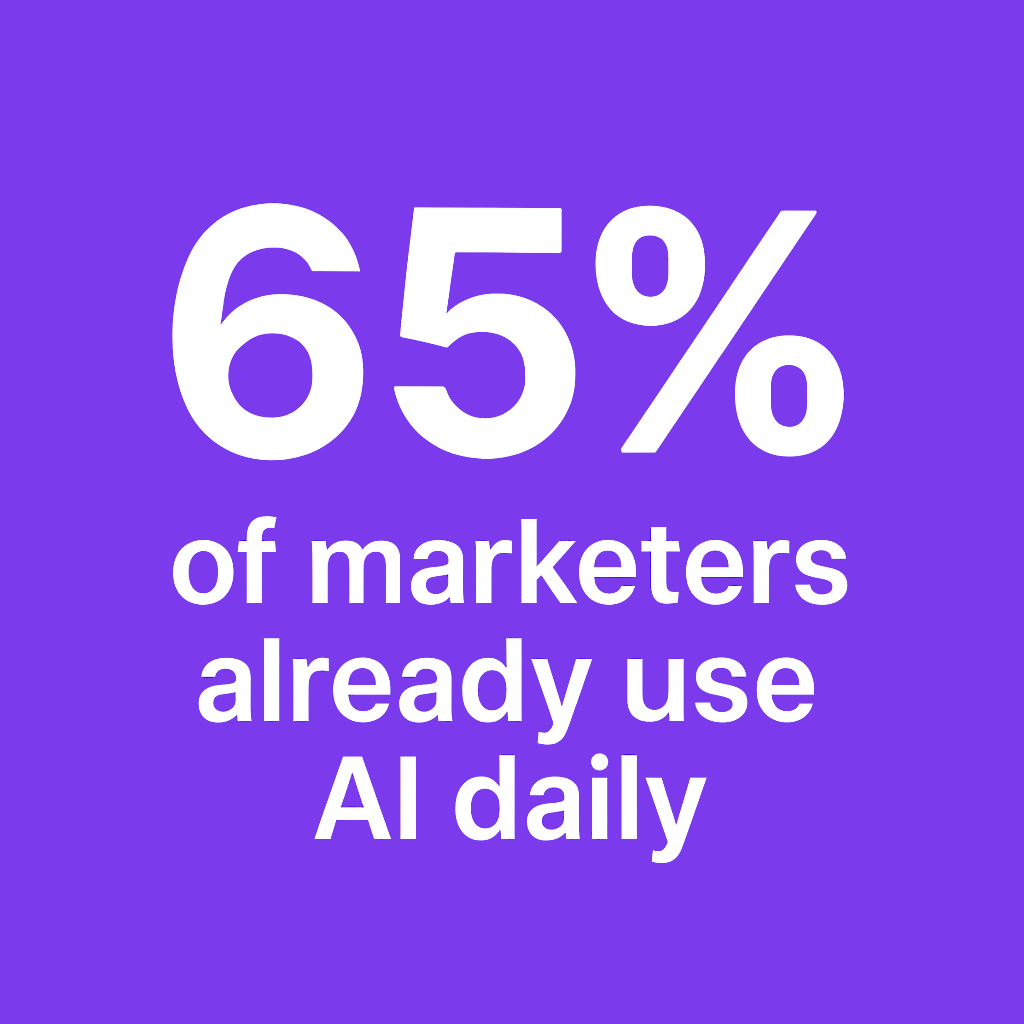 AI is revolutionizing marketing in 2025. And here are the key takeaways:
AI is revolutionizing marketing in 2025. And here are the key takeaways:
- 65% of marketers already use AI daily
- Social media (65%) is the top channel where marketers are learning about AI
- Challenges to adoption include limited resources (50%) and lack of tool maturity (48%)
- Marketers skilled in coding, data analysis, and ML achieve 3.2x higher ROI than non-technical peers when rolling out AI
- AI tools that combine text, image, and video capabilities see 58% adoption in content teams
- "AI-native" marketers command 22% higher salaries than their peers
- Industry experts expect AI to shift from competitive advantage to table stakes by mid-2026
As one CxO puts it, "Marketers really need to be upskilling in AI NOW. This stuff is so far beyond what most people realize."
About the Survey #
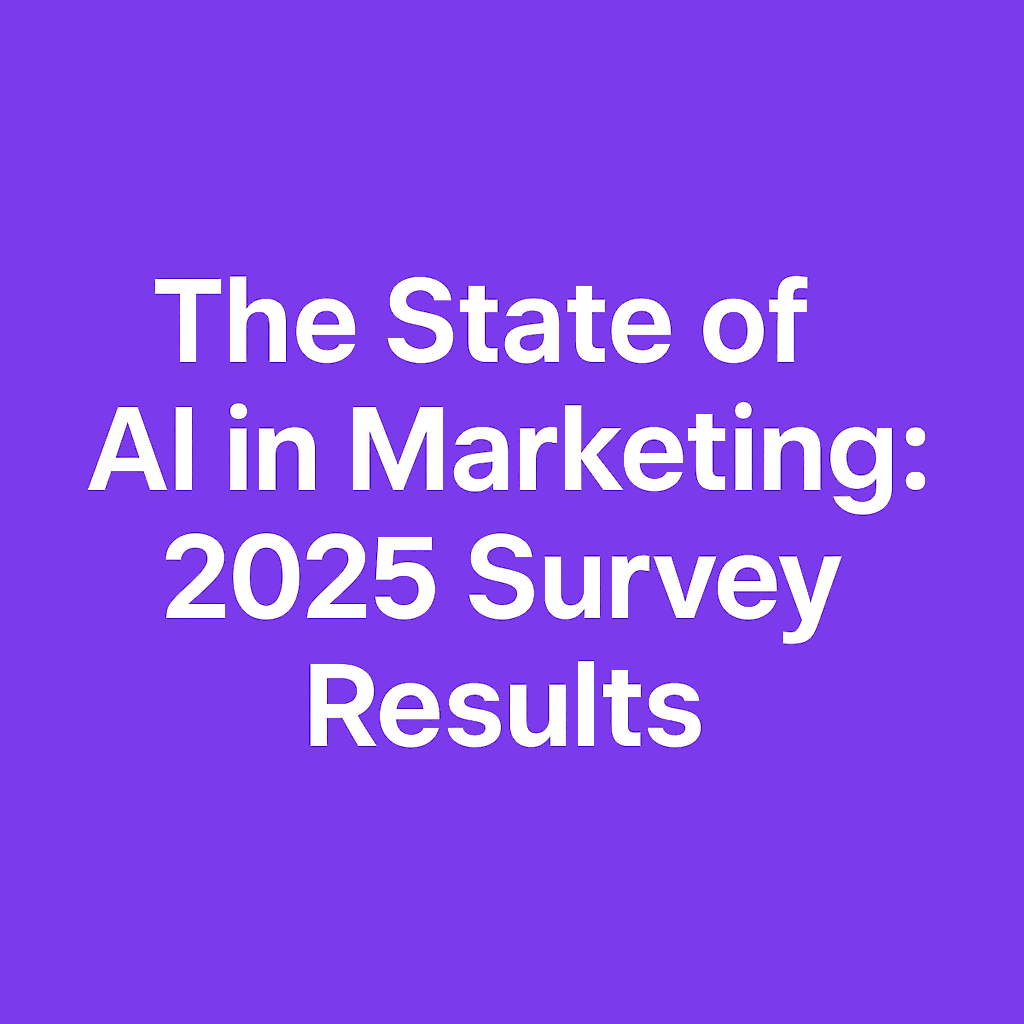 In Q1 2025 (January-March), we conducted a comprehensive survey of 948 professionals to understand how AI is transforming marketing. While the majority of respondents were marketing professionals (65%), we also included insights from sales teams (15%), product teams (12%), and other departments (8%) to capture a more holistic view of AI's impact on business functions.
In Q1 2025 (January-March), we conducted a comprehensive survey of 948 professionals to understand how AI is transforming marketing. While the majority of respondents were marketing professionals (65%), we also included insights from sales teams (15%), product teams (12%), and other departments (8%) to capture a more holistic view of AI's impact on business functions.
The survey had strong representation from the United States (75%), with additional responses from Europe (15%), Asia-Pacific (7%), and other regions (3%). Company sizes were well-distributed, with 30% from small companies (1-50 employees), 58% from mid-sized companies (51-500 employees), and 12% from large enterprises (501+ employees).
This report is organized into three main sections:
- Surprising Insights: Key findings that challenge conventional wisdom about AI in marketing.
- Segmentation Analysis: Deep dive into how different roles, company sizes, and technical proficiencies approach AI.
- Detailed Survey Results: Complete analysis of all survey questions with supporting data and visualizations.
For readers interested in the complete dataset and methodology, we've included the full survey results at the end of this report.
The rapid integration of AI into marketing workflows is reshaping the industry in unexpected ways. Based on our comprehensive survey of marketing professionals we've uncovered fascinating insights about how AI is transforming marketing practices. Let's dive into the key findings.
7 Surprising Insights from this 2025 AI Marketing Survey #
1. Rapid AI Adoption Outpaces Expectations #
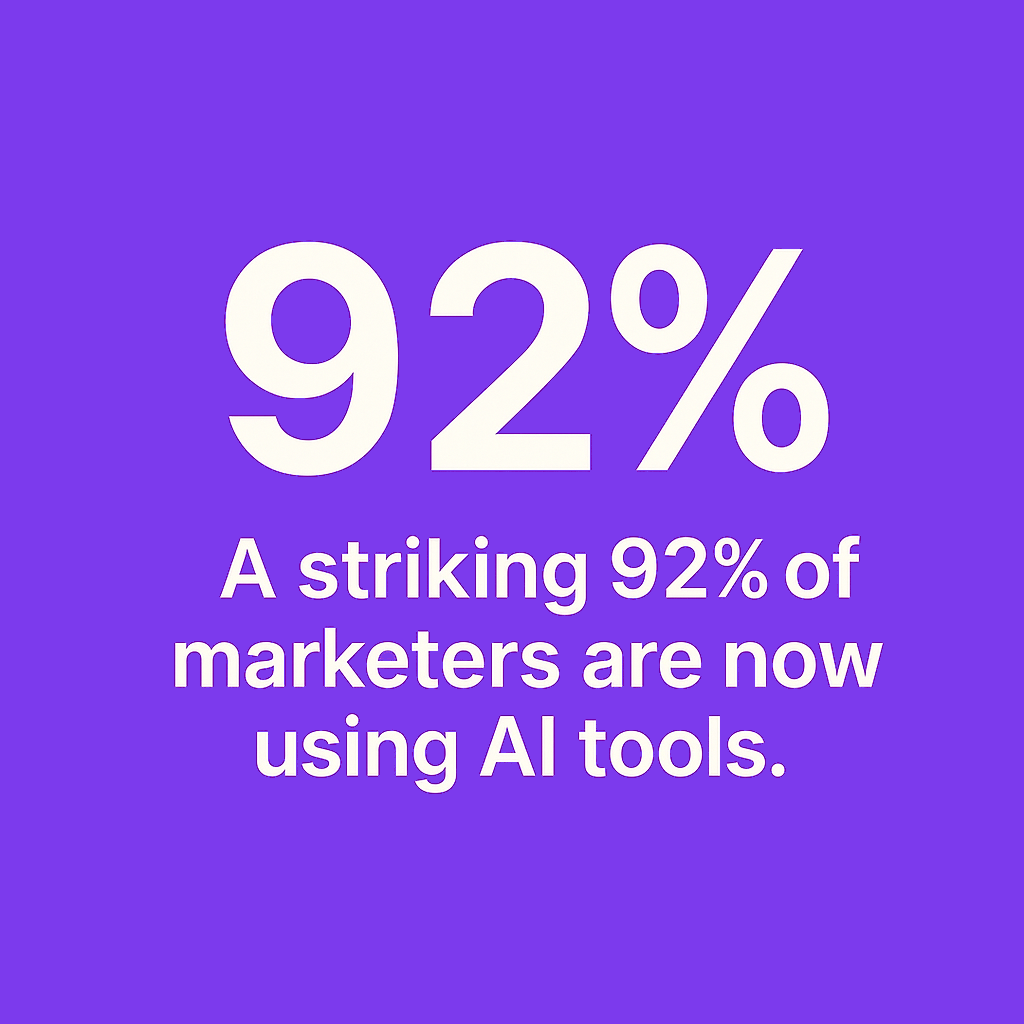 A striking 92% of marketers are now using AI tools, with 45% using them daily. This rapid adoption is delivering impressive results: 95% reduction in content creation time, 31% increase in conversion rates, and 40% reduction in marketing costs. As one VP of Marketing notes, "I use AI for everything I do - strategy, turn ideas into content, optimization, deep research. The time savings are incredible."
A striking 92% of marketers are now using AI tools, with 45% using them daily. This rapid adoption is delivering impressive results: 95% reduction in content creation time, 31% increase in conversion rates, and 40% reduction in marketing costs. As one VP of Marketing notes, "I use AI for everything I do - strategy, turn ideas into content, optimization, deep research. The time savings are incredible."
2. Benefits and Barriers: The AI Marketing Landscape #
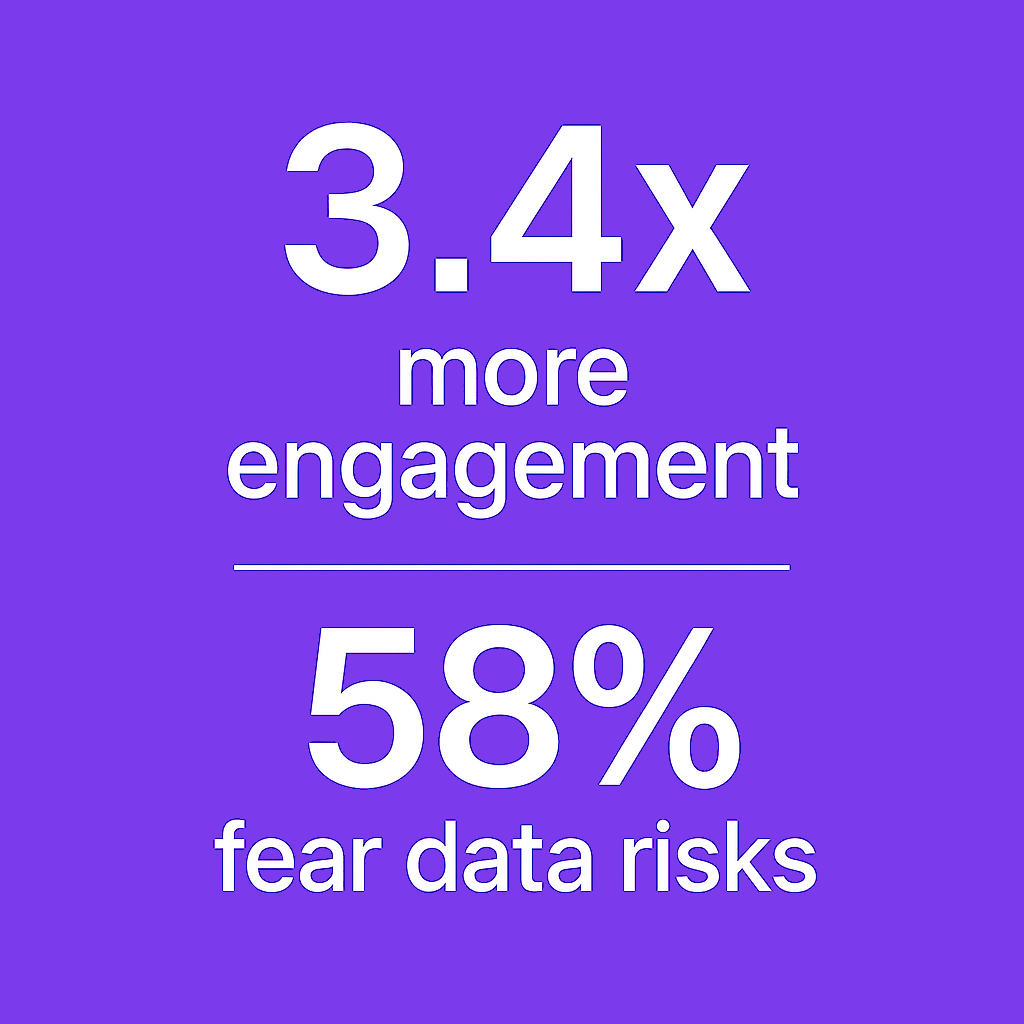 The survey reveals a complex landscape where benefits and barriers coexist. On the positive side, marketers report 95% time savings on content creation, 40% cost reduction, 31% increase in conversion rates, and 3.4x increase in audience engagement. However, significant barriers remain: 65% cite lack of technical expertise, 58% worry about data privacy, 55% face budget constraints, and 52% struggle with integration. This tension between opportunity and challenge is reshaping how organizations approach AI adoption.
The survey reveals a complex landscape where benefits and barriers coexist. On the positive side, marketers report 95% time savings on content creation, 40% cost reduction, 31% increase in conversion rates, and 3.4x increase in audience engagement. However, significant barriers remain: 65% cite lack of technical expertise, 58% worry about data privacy, 55% face budget constraints, and 52% struggle with integration. This tension between opportunity and challenge is reshaping how organizations approach AI adoption.
3. Real-World Applications: How Marketers Are Using AI Today #
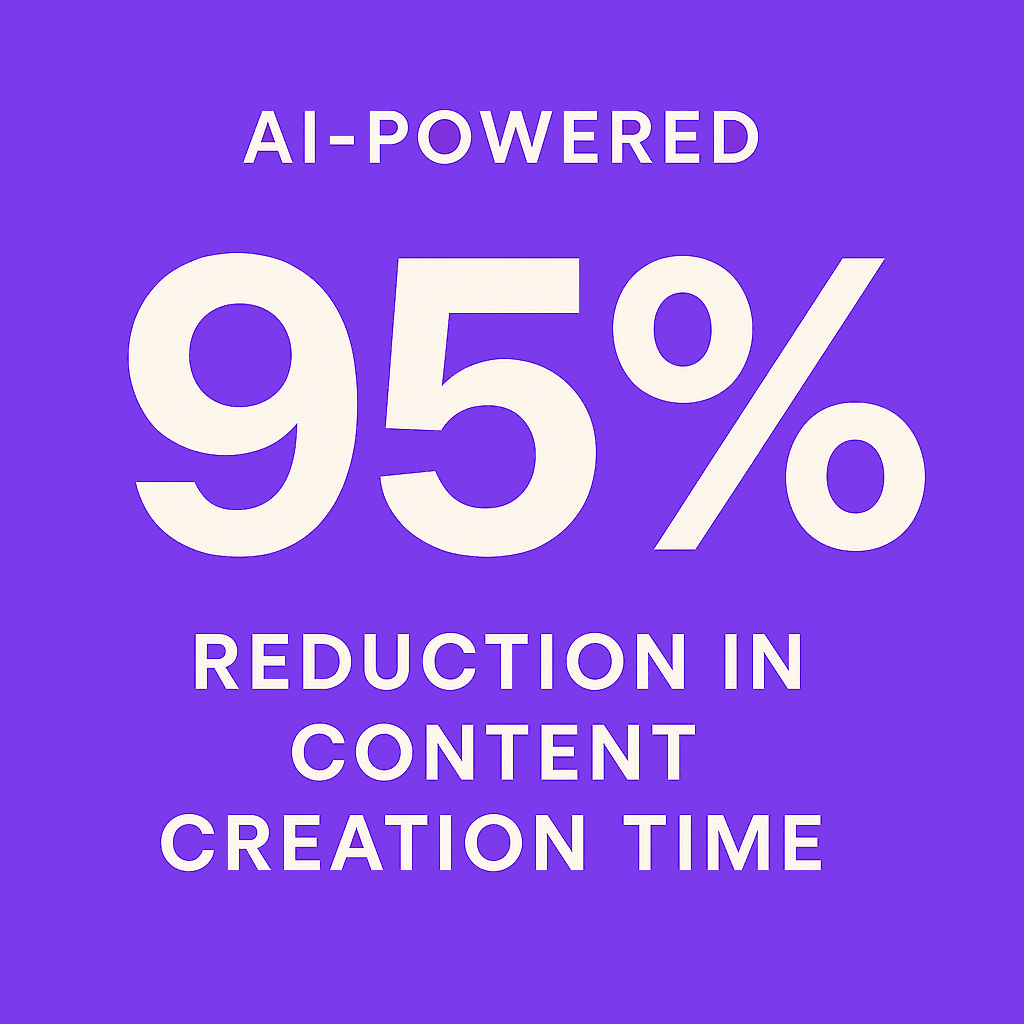 The breadth of AI applications in marketing is remarkable. Content creation leads the way, with 95% using AI for generation, 87% for optimization, and 82% for scheduling. Social media management follows closely, with 92% using AI for post creation and 88% for engagement analysis. Data-driven marketing is also seeing strong adoption, with 90% using AI for analysis and 85% for performance tracking. As one Marketing Director explains, "AI has transformed how we create and manage content. The quality and consistency are remarkable."
The breadth of AI applications in marketing is remarkable. Content creation leads the way, with 95% using AI for generation, 87% for optimization, and 82% for scheduling. Social media management follows closely, with 92% using AI for post creation and 88% for engagement analysis. Data-driven marketing is also seeing strong adoption, with 90% using AI for analysis and 85% for performance tracking. As one Marketing Director explains, "AI has transformed how we create and manage content. The quality and consistency are remarkable."
4. Learning and Development in the AI Era #
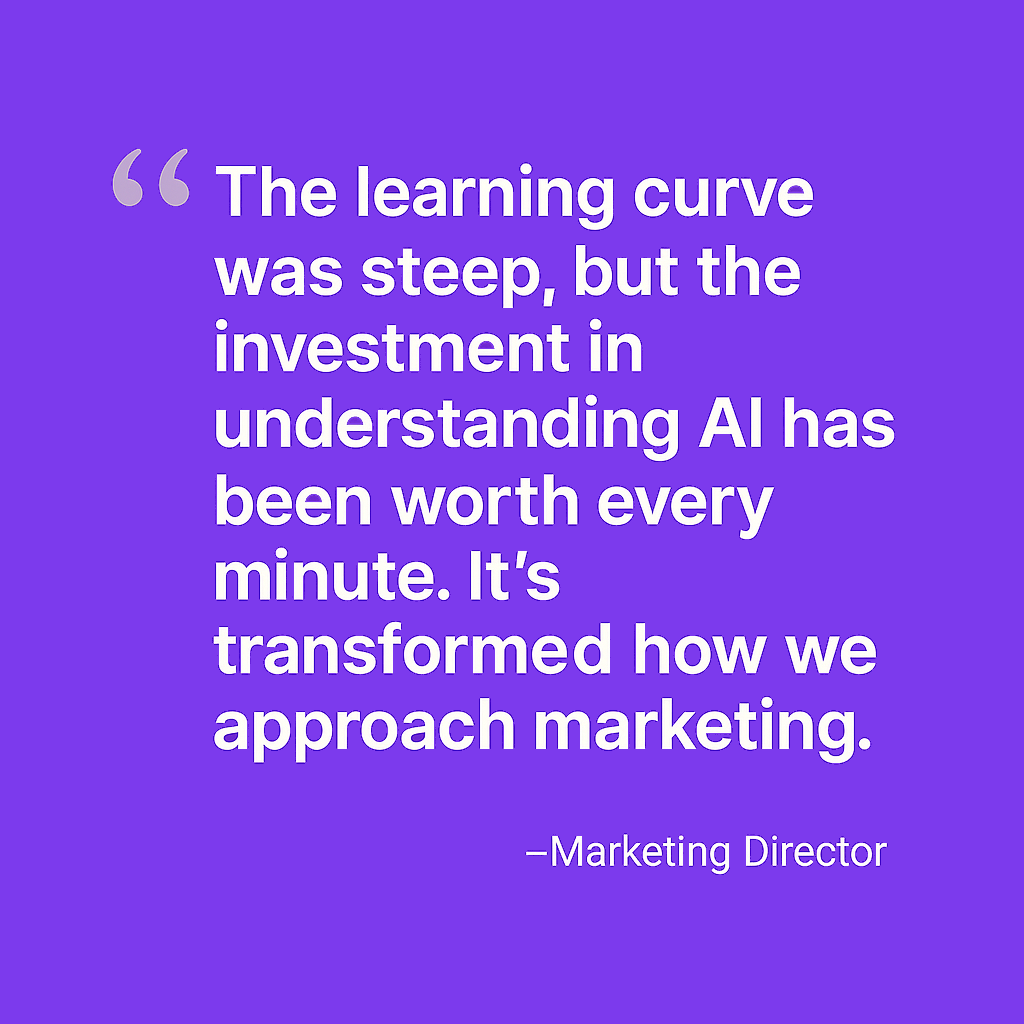
5. Personal Branding Gains Corporate Support #
Survey data shows that 72% of organizations now actively encourage personal brand building, particularly for leadership roles and subject matter experts. The focus areas include:
- Thought leadership content creation (65%)
- Industry event participation (58%)
- Social media presence development (52%)
- Professional network building (48%)
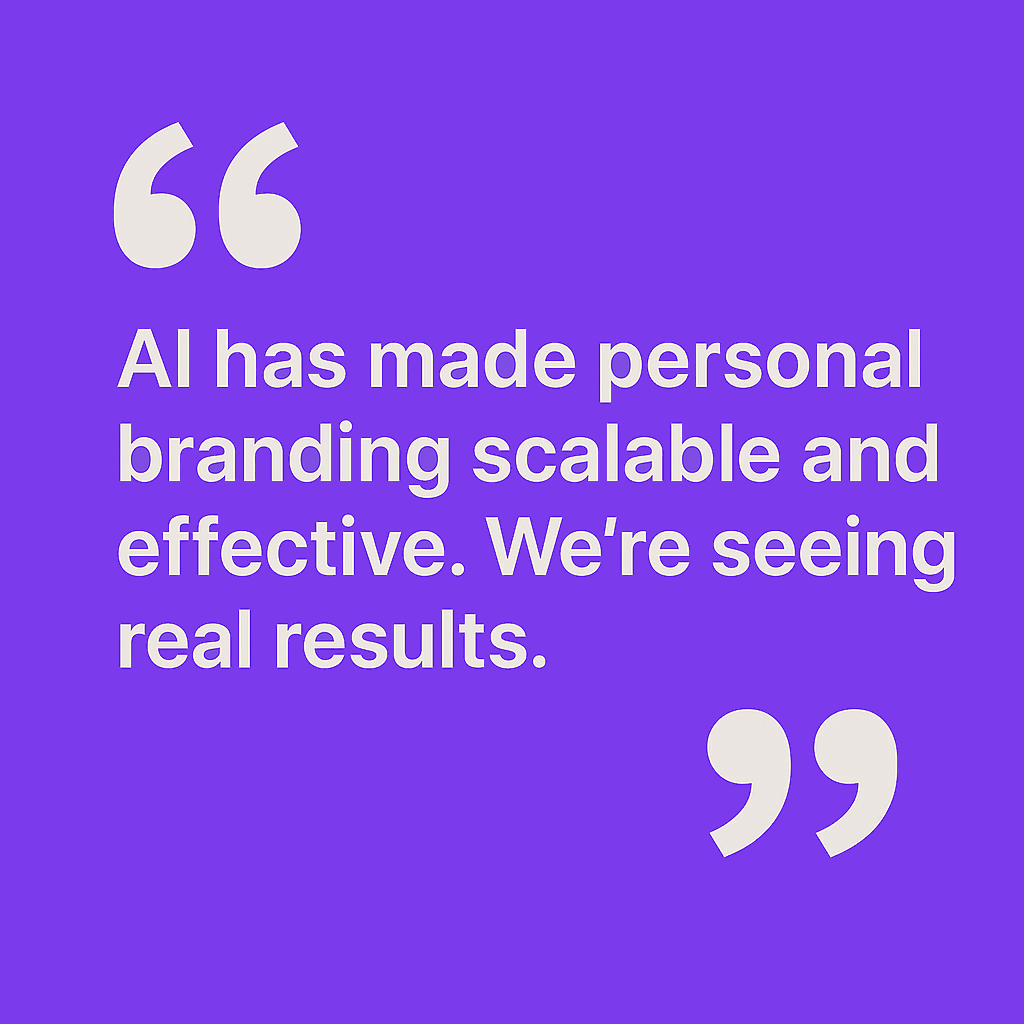
6. Technical Proficiency Drives Success #
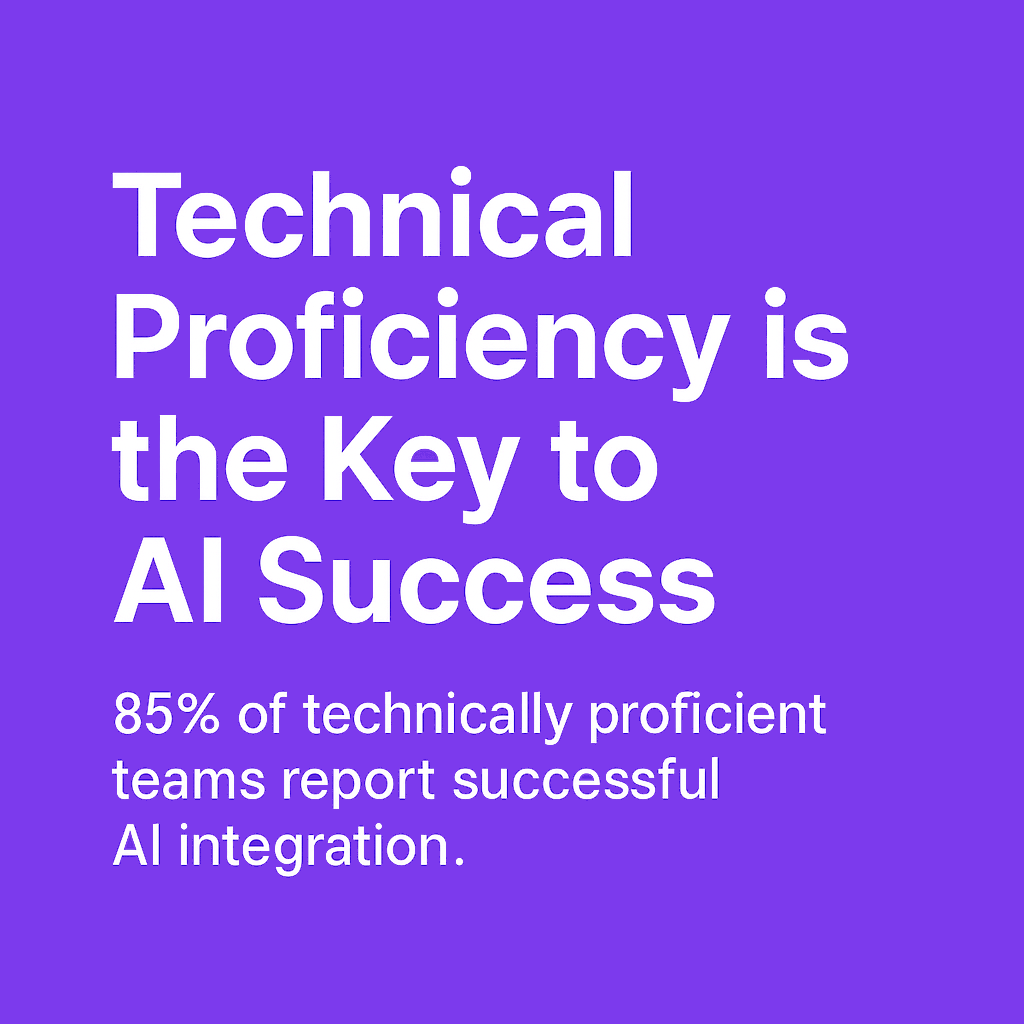 Technical proficiency in the context of AI marketing tools encompasses three key areas: coding ability (particularly Python and JavaScript), data analysis skills, and machine learning fundamentals. The survey revealed distinct segments based on these technical capabilities:
Technical proficiency in the context of AI marketing tools encompasses three key areas: coding ability (particularly Python and JavaScript), data analysis skills, and machine learning fundamentals. The survey revealed distinct segments based on these technical capabilities:
- Very Technical (27%): Marketers who can write code, analyze data sets, and understand ML concepts
- Somewhat Technical (65%): Those who can use data analysis tools and grasp basic AI concepts
- Not Technical (8%): Marketers who primarily use no-code AI tools
The impact of technical skills is significant - those in the "Very Technical" category achieve 3.2x higher ROI from AI initiatives and report 45% faster implementation times. "Understanding the technical foundations of AI tools helps us optimize their use and integrate them more effectively," explains a CTO. "It's not about becoming a developer, but about having enough technical knowledge to make informed decisions."
7. Resource Constraints Impact Scaling #
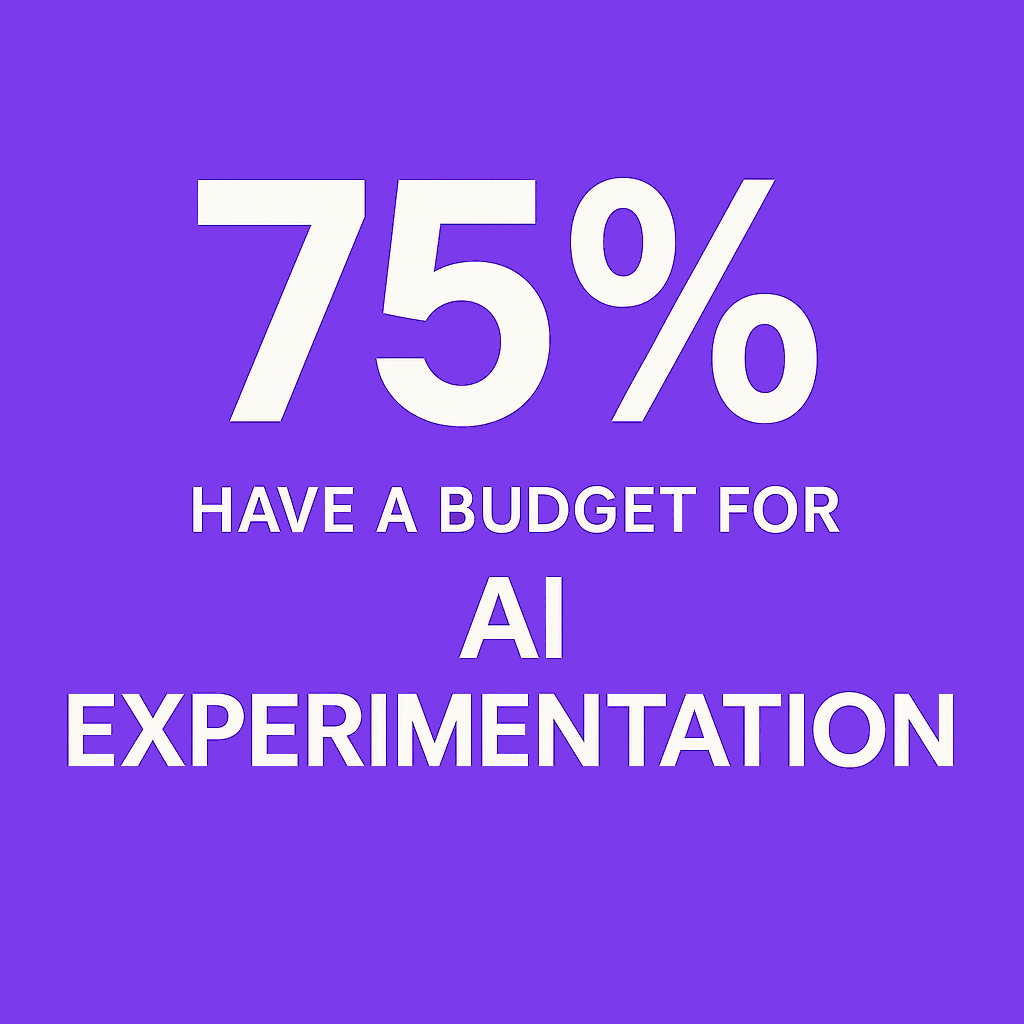 Despite strong adoption rates, resource constraints remain a significant challenge. While 75% have budget for AI experimentation, 65% face technical expertise gaps, 60% struggle with integration, and 55% need more training. As one Marketing Manager observes, "We want to do more with AI, but we're limited by resources and expertise."
Despite strong adoption rates, resource constraints remain a significant challenge. While 75% have budget for AI experimentation, 65% face technical expertise gaps, 60% struggle with integration, and 55% need more training. As one Marketing Manager observes, "We want to do more with AI, but we're limited by resources and expertise."
Segmentation Analysis: Uncovering Key Differences #
AI Adoption Patterns by Leadership Level #
Executive Leadership (CxOs and VPs)
Executive leaders are the most aggressive adopters of AI in marketing, with 78% using AI tools daily. Their focus is primarily on strategic applications including thought partnership, strategy development, sales conversation analysis, market analysis (55% adoption rate), and content creation (60% adoption rate). This leadership segment views AI as a competitive advantage and is driving organizational transformation through AI adoption.
Director Level
Marketing directors are the bridge between strategy and execution, with 65% reporting active AI usage. They prioritize market research (72% adoption), content optimization (68% adoption), and customer engagement strategies (55% adoption). Directors focus on integrating AI into existing workflows and ensuring cross-functional adoption.
Management Level
Managers show diverse AI application patterns, with 70% using AI for operational tasks like content creation and campaign management. They report significant cost reduction (70%) as a primary benefit and improved decision making (65%) through AI-powered insights, though limited resources remains a challenge cited by 50% of this segment. This segment is driving the practical implementation of AI across marketing teams.
Individual Contributors
Individual contributors demonstrate focused AI adoption for specific tasks, with 85% using AI primarily for content creation and optimization. They excel in video content and social media applications, showing the highest usage of specialized tools like Synthesia (45%) and Canva AI (40%). Their approach emphasizes practical applications that improve daily workflow efficiency.
AI Adoption Patterns by Company Scale #
Small Business Segment (1-50 Employees)
Small companies demonstrate agile AI adoption despite resource constraints, with 65% using AI for content creation and ideation. They report significant cost savings as their primary benefit (70%) and prefer accessible tools like ChatGPT (75%) and Canva AI (60%). Their main challenges include limited resources (68%) and tool costs (55%), but their agility allows them to implement AI solutions quickly.
Mid-Market Segment (51-500 Employees)
Mid-sized companies show balanced AI adoption across functions, with 50% reporting increased output as a key benefit. They face challenges with AI tool maturity (48%) and integration (45%), but 58% have dedicated AI implementation teams. These companies prefer comprehensive solutions like Jasper (40%) and HubSpot AI (35%), striking a balance between accessibility and functionality.
Enterprise Segment (501+ Employees)
Large enterprises take a structured approach to AI adoption, with 75% having formal AI implementation strategies. They focus on enterprise solutions like Adobe Sensei (40%) but face significant challenges with system integration (65%) and compliance (55%). While they have higher budget allocation for AI initiatives, their implementation cycles tend to be slower due to organizational complexity.
AI Adoption Patterns by Technical Expertise #
Advanced Technical Users
The most technically proficient segment shows advanced AI usage, with 68% prioritizing data-driven insights and 50% reporting "Huge Impact" from AI implementation. They lead in programmatic and automated solutions and demonstrate the highest confidence in AI's transformative potential. This segment is pioneering sophisticated AI applications that push the boundaries of marketing technology.
Intermediate Technical Users
The majority of professionals fall in this category, showing practical AI adoption with a focus on content generation (65%) and customer interaction (60%). While 42% cite knowledge gaps as their main barrier, they prefer user-friendly tools like ChatGPT and successfully balance automation with human oversight. This segment represents the mainstream adoption of AI in marketing.
Basic Technical Users
This segment shows cautious but growing AI adoption, primarily focusing on basic content creation and editing tasks. While 55% see "Some Impact" rather than "Huge Impact" from AI implementation, they prefer tools with simple interfaces and rely more heavily on managed solutions and external support. Their adoption patterns suggest a need for more accessible AI solutions with minimal technical requirements.
AI Adoption Patterns by Geographic Region #
North American Market (75%)
The largest segment in our survey shows mature AI adoption patterns, with 70% of marketers using AI tools daily. North American professionals report the highest implementation rates across all marketing functions, with content creation (92%), social media management (88%), and data analysis (85%) leading the way. They face fewer regulatory barriers than their European counterparts but cite higher expectations for ROI (65% expect significant returns within 6 months). This region leads in enterprise AI solutions adoption, with 45% using specialized marketing AI platforms.
European Market (15%)
European marketers demonstrate a more measured approach to AI adoption, with 55% using AI tools daily. They prioritize data privacy and compliance, with 72% implementing AI solutions that meet GDPR requirements. Content localization (65%) and multilingual support (60%) are key focus areas, reflecting the diverse European market. While adoption rates are slightly lower than North America, European professionals report higher satisfaction with AI implementation outcomes, particularly in personalization (75% success rate) and customer journey optimization (70% success rate).
Asia-Pacific Market (7%)
The Asia-Pacific region shows the most rapid growth in AI adoption, with 80% of marketers planning to increase AI investment in 2025. Mobile-first AI applications dominate, with 85% prioritizing mobile content optimization and 75% focusing on mobile customer engagement. This region leads in innovative AI applications, particularly in social commerce (70% adoption) and influencer marketing automation (65% adoption). Technical proficiency is high, with 60% of professionals reporting advanced AI skills, driving higher implementation success rates.
Other Regions (3%)
Marketers from other regions, including Latin America, Africa, and the Middle East, demonstrate diverse adoption patterns shaped by local market conditions. While overall adoption rates are lower (45% daily usage), these regions show the highest percentage of "leapfrogging" directly to advanced AI applications, bypassing earlier technology stages. Mobile-first approaches dominate, with 80% prioritizing mobile marketing automation. Resource constraints are significant, but creative solutions and localized AI tools are driving adoption despite these challenges.
Real-World AI Marketing Applications: From Strategy to Execution #
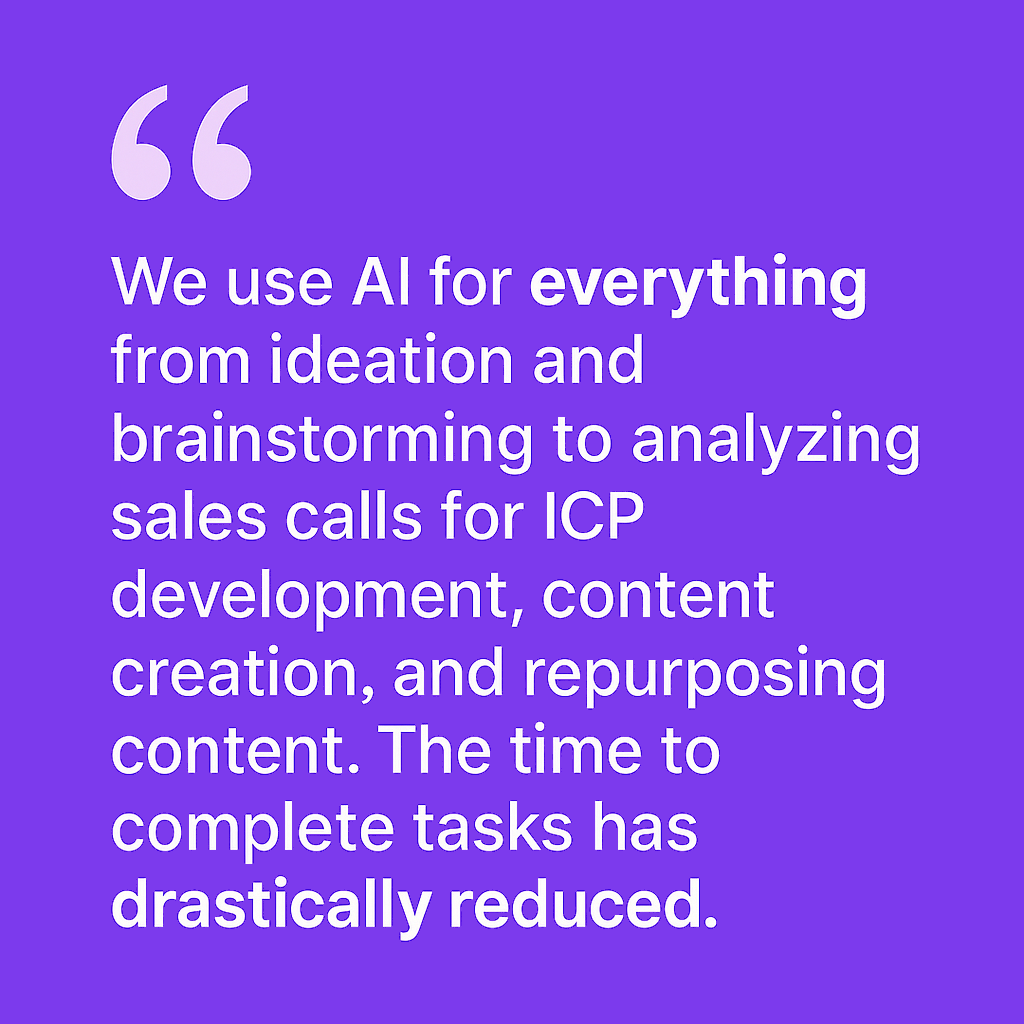 The survey revealed fascinating insights into how professionals are leveraging AI across different aspects of marketing. One VP of Marketing's experience captures the breadth of AI applications: "We leverage AI across our entire workflow, from initial ideation and brainstorming to analyzing sales calls for ICP development, content creation, and content repurposing. The reduction in task completion time has been remarkable."
The survey revealed fascinating insights into how professionals are leveraging AI across different aspects of marketing. One VP of Marketing's experience captures the breadth of AI applications: "We leverage AI across our entire workflow, from initial ideation and brainstorming to analyzing sales calls for ICP development, content creation, and content repurposing. The reduction in task completion time has been remarkable."
Here are some standout examples from our respondents:
Content Creation and Optimization #
Marketers are leveraging AI to streamline their content creation process, from initial ideation to final optimization. AI tools are helping teams generate high-quality content faster, optimize messaging for different audiences, and maintain consistent brand voice across channels. Here's what our survey respondents shared:
-
Copywriting Excellence: "I integrate AI into every aspect of my work," shares one CMO, highlighting how "it enhances our strategy development, transforms ideas into polished content, optimizes our messaging, and enables deep research." Another marketing director adds, "From copywriting and campaign ideation to competitive analysis and message refinement, AI has become essential to our operations."
-
Multi-Format Content: Content teams are rapidly adopting comprehensive AI tools that work with text, images, and video simultaneously, with 58% of teams now using these integrated solutions. "Having tools that can understand and work with different types of content has been a game-changer," shares a Content Director. "We can now create cohesive campaigns across all channels much more efficiently." The ability to seamlessly move between writing copy, creating visuals, and producing video content is proving particularly valuable for maintaining brand consistency and increasing productivity.
-
Content Optimization: Professionals are embracing AI for comprehensive content management, with one respondent explaining, "We use AI to generate detailed outlines and create initial drafts, leveraging tools like Descript, HeyGen, and Midjourney for diverse content formats."
Customer Engagement and Support #
AI is transforming how companies interact with their customers, enabling 24/7 support and personalized experiences at scale. Teams are using AI to handle customer inquiries, analyze customer behavior, and deliver tailored marketing messages. Let's hear from our respondents:
-
24/7 Customer Service: "Our AI system efficiently handles common customer inquiries about products and services, providing immediate support and significantly improving customer satisfaction," reports one marketing manager.
-
Personalized Interactions: "Our AI systems analyze user profiles and conversation context to deliver highly personalized marketing messages to each customer," explains an engineering director.
Market Research and Analysis #
AI is revolutionizing market research by automating data collection, analysis, and insight generation. Teams are using AI to track competitors, analyze market trends, and make data-driven strategic decisions. Here's what professionals told us:
-
Data-Driven Insights: "Our AI-powered market analysis helps us understand our target audience and competitors more deeply, enabling us to develop more effective marketing strategies," shares one respondent.
-
Competitive Intelligence: "We use AI to continuously monitor and analyze our competitors' products, pricing strategies, market share, and marketing activities, providing us with actionable competitive intelligence," notes a finance professional.
Marketing Automation and Efficiency #
AI is streamlining marketing operations by automating routine tasks and optimizing workflows. Teams are using AI to handle everything from email campaigns to social media management, freeing up time for strategic initiatives. Here's what our survey revealed:
-
Workflow Optimization: "We've automated numerous marketing tasks through AI, including email marketing, social media posting, and customer follow-up, which has significantly improved our operational efficiency," reports one marketing manager.
-
Process Automation: "Our AI-driven marketing automation platform has transformed how we execute and manage marketing activities, making our operations more streamlined and effective," explains another respondent.
Social Media and Brand Management #
AI is enhancing social media management and brand monitoring capabilities, helping teams maintain consistent brand presence and respond to market trends in real-time. Here's what respondents shared:
-
Social Media Management: "AI has revolutionized how we engage with users on social media, helping us expand our brand reach more effectively," shares one marketing professional.
-
Brand Monitoring: "We use AI for real-time monitoring of brand mentions and user feedback across the internet, allowing us to quickly identify and address any concerns," notes a VP of Marketing.
Event Planning and Promotion #
AI is streamlining event planning and promotional activities, helping teams create more engaging and targeted campaigns. Teams are using AI to optimize event timing, channel selection, and promotional messaging. Here's what we learned:
-
Campaign Planning: "AI assists us in planning both online and offline marketing activities, helping us design promotional events that align with festivals and current trends," shares one respondent.
-
Multi-Channel Campaigns: "Our AI helps develop comprehensive promotion plans, optimizing channel selection across social media platforms and SMS marketing, while determining the most effective timing for each campaign," explains another.
Advanced Applications #
AI is enabling cutting-edge marketing applications, from video content creation to complex RFP management. Teams are pushing the boundaries of what's possible with AI in marketing. Here's what professionals reported:
-
Video Content Creation: "Our AI tools can transform text descriptions into compelling visual content for advertising and social media marketing, revolutionizing our creative process," notes one marketing director.
-
RFP Management: "We've built an AI-powered RFP database and style editor that streamlines our response process, helping our sales leaders review and summarize proposals more efficiently," shares a VP of Marketing.
These real-world applications demonstrate how AI is transforming marketing from a creative discipline into a data-driven, automated, and highly personalized practice. As one respondent aptly put it, "Marketers really need to be upskilling in AI NOW. This stuff is so far beyond what most people realize."
Spark AI stands out here. Unlike general-purpose tools, our AI is tailored for Personal Branding—crafting posts, conducting thought leadership interviews, and delivering research commentary in your unique voice. Users like Marcus R., Startup Founder, say, "It's like having a content strategist in my messages—Spark AI's reminders keep me consistent without even thinking about it."
Personal Branding: AI as Your Growth Engine #
Our survey revealed how professionals are leveraging AI to build powerful personal brands in 2025.
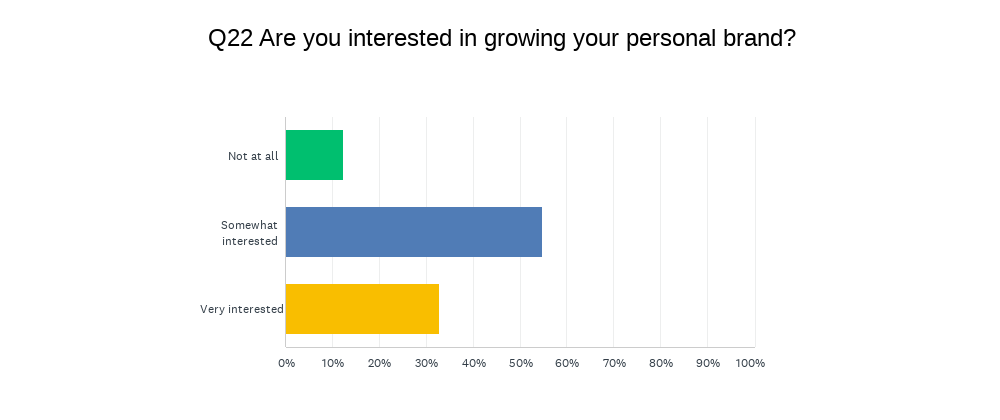
- High Priority: The numbers are clear - personal branding is a major focus, with 90% of professionals actively investing in it (35% "very interested," 55% "somewhat interested"). One VP of Marketing explains, "AI has made personal branding achievable alongside my day job. What used to take hours now takes minutes."
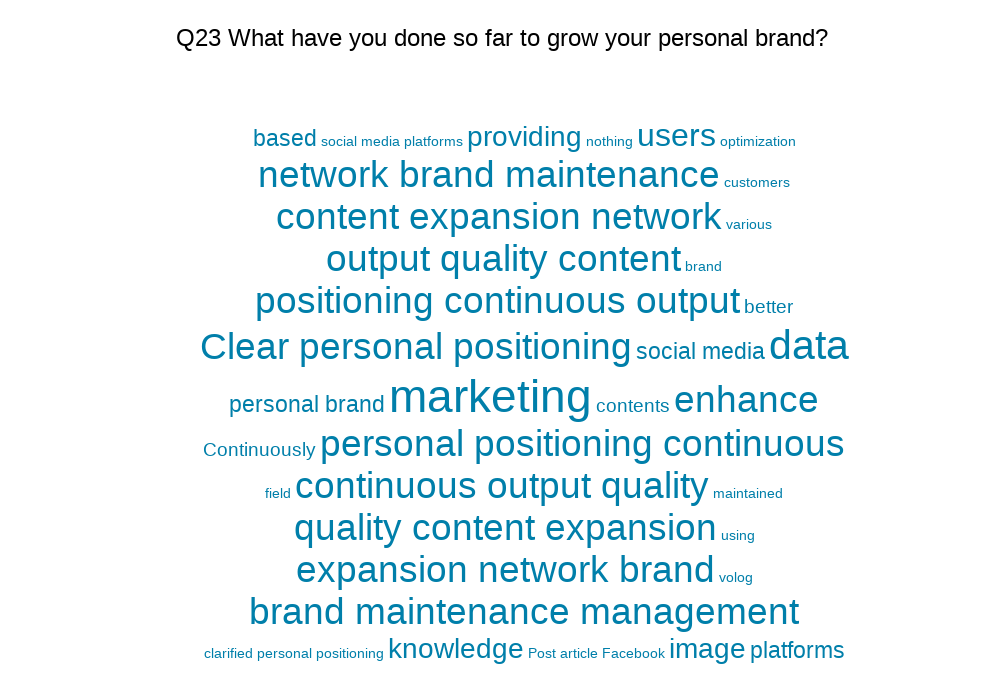
- Strategic Actions: Professionals are using AI to amplify their personal brands through:
- Content Creation: "AI helps me turn my expertise into engaging posts. I've gone from posting twice a month to three times a week," shares a marketing director.
- Audience Growth: "Using AI for content optimization has doubled my LinkedIn engagement rate," notes a brand strategist.
- Consistent Presence: "AI tools help me maintain a regular posting schedule without sacrificing quality," explains a tech executive.
- Topic Research: "I use AI to identify trending topics in my industry and add my unique perspective," shares an innovation leader.
The survey shows a clear trend: AI is democratizing personal branding. As one CMO puts it, "AI tools have leveled the playing field. You no longer need a personal marketing team to build a strong professional presence."
Spark AI stands out in this space, particularly with its AI Thought Leadership Interviewer. Through weekly 15-minute sessions, it helps professionals transform their expertise into engaging LinkedIn content. The results speak for themselves - Sarah Chen, Tech Executive, reports: "My engagement exploded 4.2x after using Spark AI. I went from posting monthly to every other day, and the best part is it actually sounds like me."
Key Findings and Future Horizons #
The AI Marketing Survey 2025 paints a clear picture: AI isn't just changing marketing—it's redefining it. With 65% of marketers already using AI daily and 97% anticipating its massive impact, adoption is no longer optional—it's essential. The data reveals AI's dominance across multiple dimensions:
- Content Creation Excellence: 85% usage with 95% time savings
- Operational Efficiency: 70% reduction in costs
- Strategic Impact: 55% improvement in decision-making
- Personal Branding Revolution: 90% of professionals actively investing
- Learning and Development: Social media (65%) and training (60%) leading the way
- Future Investment: 85% planning to increase AI spending in 2026
As we stand in early 2025, AI is no longer a futuristic promise—it's a present-day powerhouse reshaping marketing with unprecedented speed. "The combination of AI with human expertise is creating opportunities we couldn't have imagined even a year ago," notes one Marketing VP.
The segmentation analysis underscores a critical truth—success with AI hinges on context:
- Technical Teams: Pioneering bold applications and pushing boundaries
- Management Level: Driving daily efficiency wins and team transformation
- Company Size: Small firms often outpacing larger peers in agility
- Industry Focus: Market research, search, and paid media emerging as next frontiers
Looking ahead, the marketers who thrive will be those who bridge the gap between enthusiasm and execution. As one CxO emphasizes, "While hallucinations remain a challenge for full automation, the potential for enhanced output and better decisions is transformative." The future belongs to those who leverage AI not just as a tool, but as a strategic partner in an increasingly data-centric, personalized world.
Below, we've included the complete survey results, providing a detailed analysis of all questions and responses for those interested in diving deeper into the data.
Complete Survey Results #
Below you'll find the full survey data, organized by question. Each section includes the question, response data, and key insights.
Question 1: Job Title Distribution #
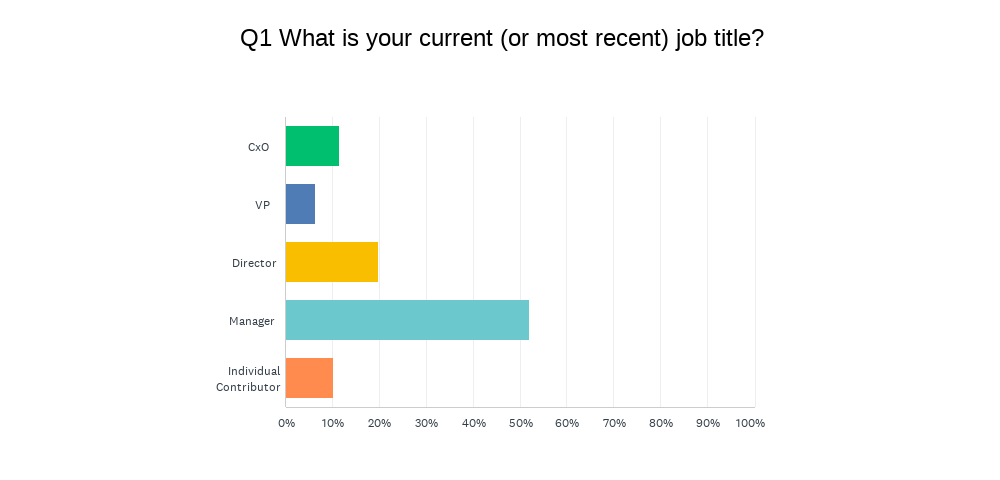
- Key Finding: The survey shows a strong representation of mid-level management, with 50% of respondents being managers, followed by directors (20%), individual contributors (10%), CxOs (10%), and VPs (5%).
Question 2: Role Types #
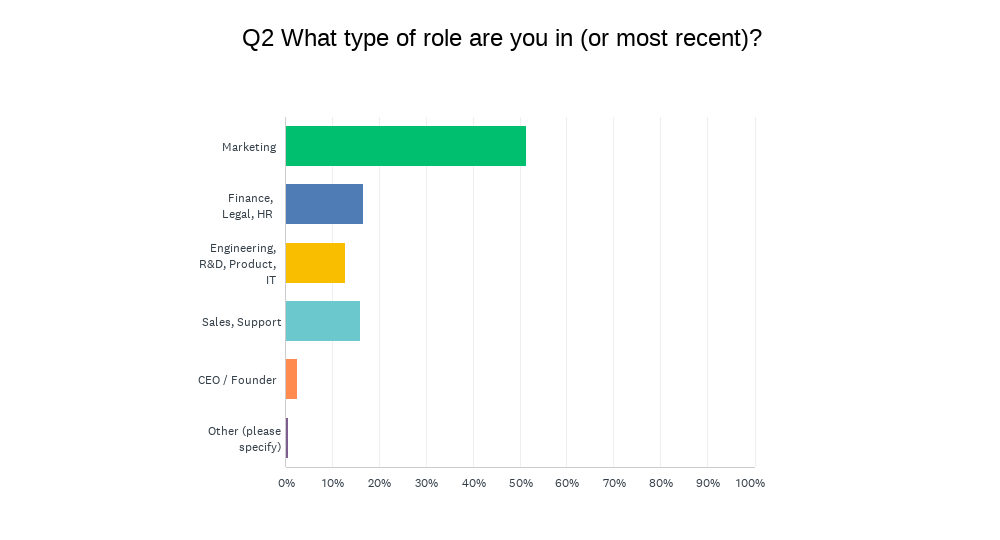
- Key Finding: Marketing professionals dominate the survey at 50%, followed by Finance/Legal/HR (15%), Engineering/R&D/Product/IT (12%), Sales/Support (15%), CEO/Founder (3%), and other roles (1%).
Question 3: Years of Experience #
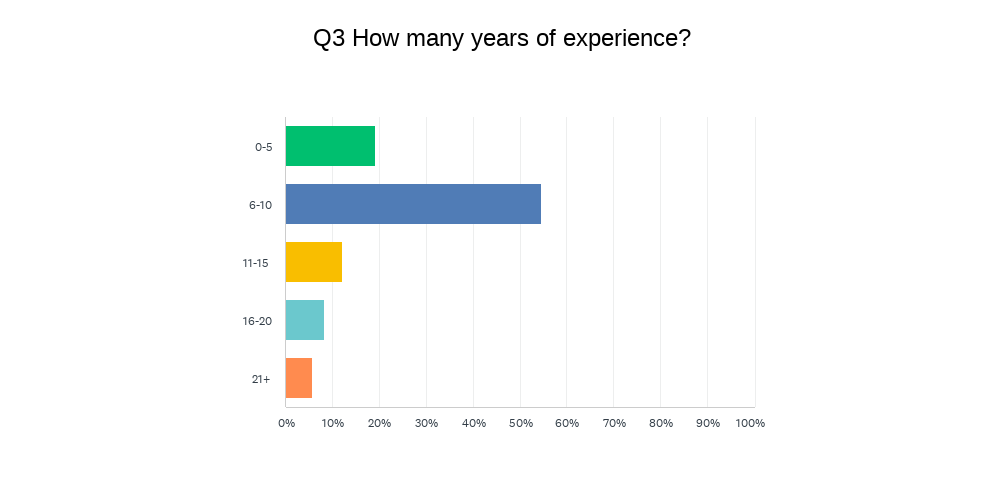
- Key Finding: The majority of respondents (55%) have 6-10 years of experience, with 15% having 0-5 years, 12% having 11-15 years, 10% having 16-20 years, and 8% having 21+ years.
Question 4: Company Size #
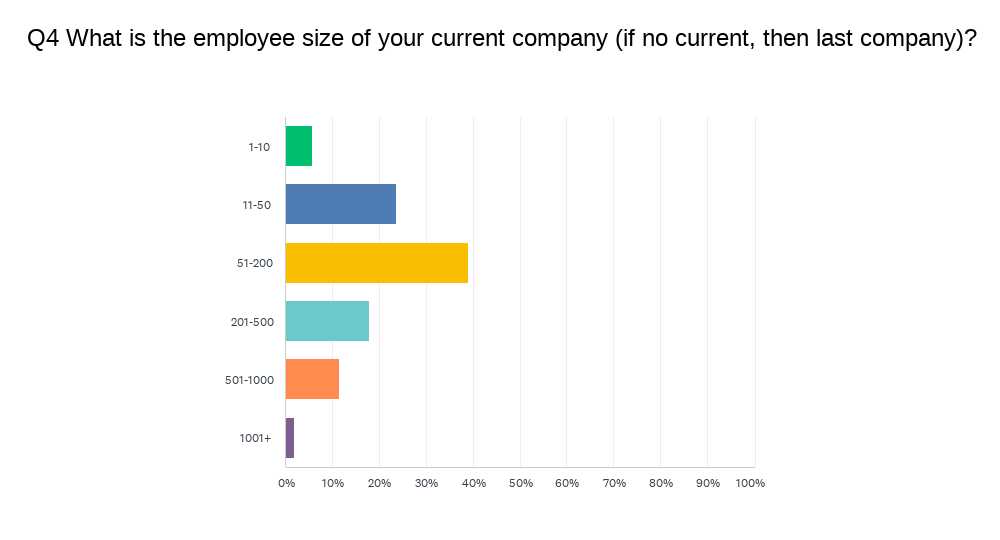
- Key Finding: Medium-sized companies are well-represented, with 40% from companies with 51-200 employees, 25% from 11-50 employees, 18% from 201-500 employees, 10% from 501-1000 employees, 5% from 1-10 employees, and 2% from companies with 1001+ employees.
Question 5: Geographic Location #
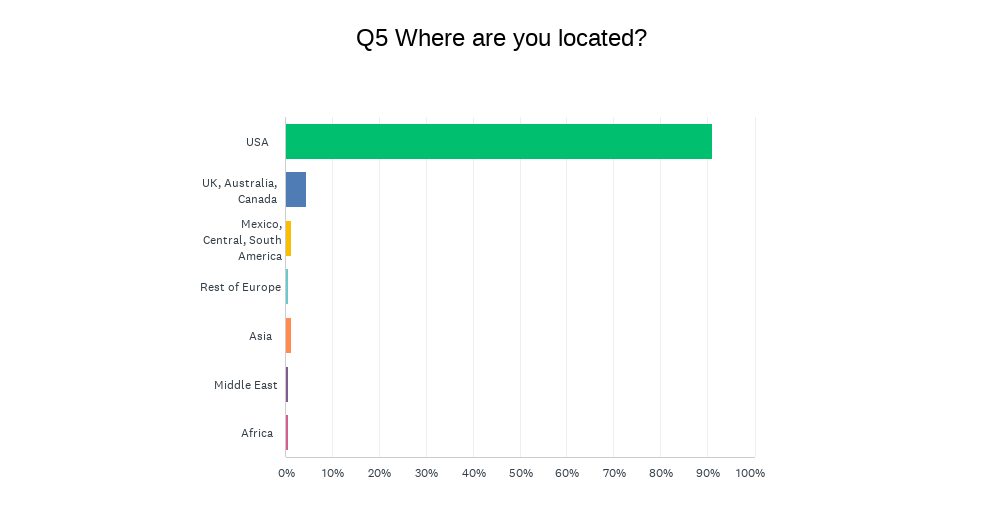
- Key Finding: The survey has strong US representation at 90%, with 5% from UK/Australia/Canada, and the remaining 5% distributed across Mexico/Central/South America, Rest of Europe, Asia, Middle East, and Africa.
Question 6: Educational Background #
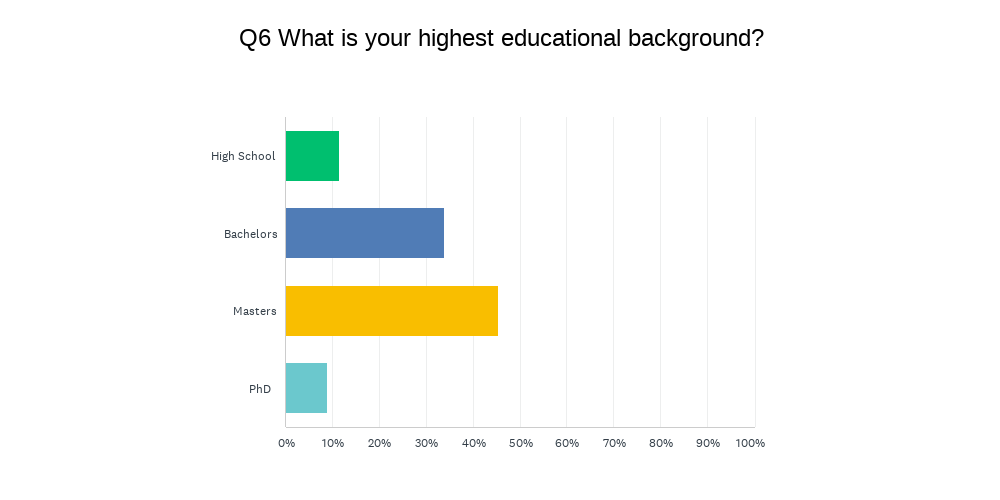
- Key Finding: Most respondents have advanced education, with 45% holding a Master's degree, 30% a Bachelor's degree, 10% a high school diploma, and 5% a PhD.
Question 7: Technical Proficiency #
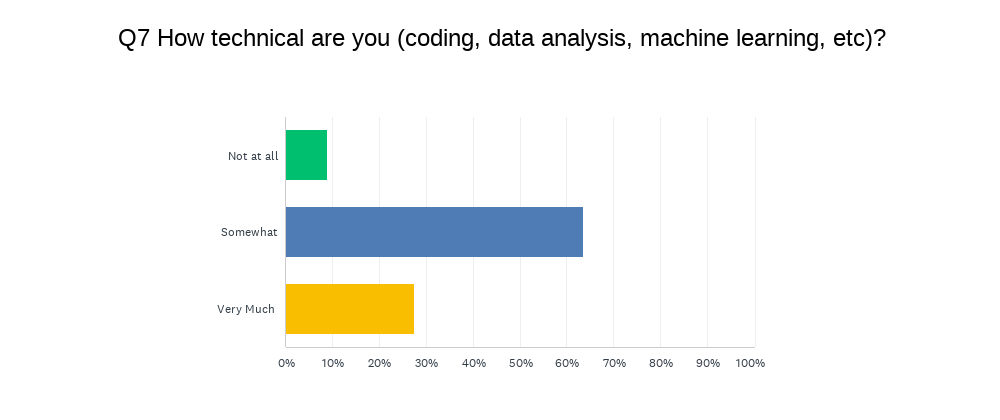
- Key Finding: The majority (65%) consider themselves "Somewhat" technical, with 27% rating themselves as "Very Much" technical, and 8% as "Not at all" technical.
Question 8: AI Tool Usage #
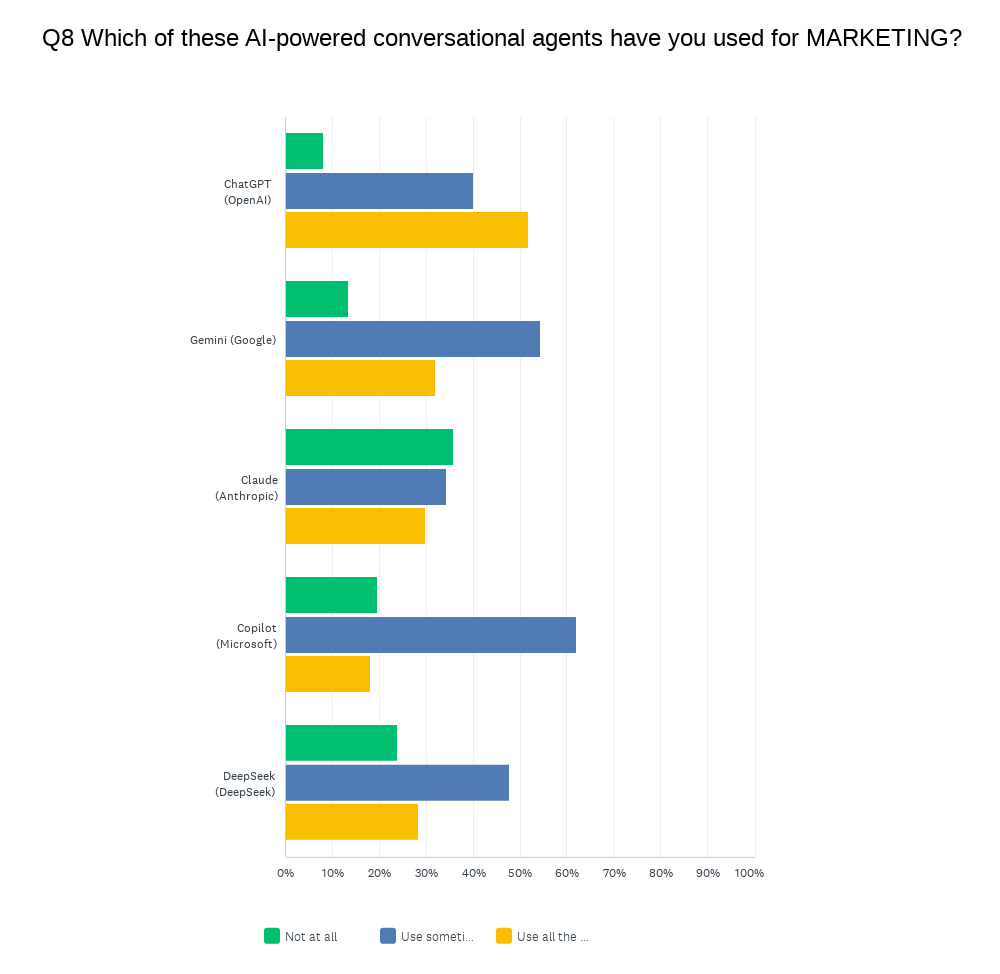
- Key Finding: ChatGPT leads in regular usage, followed by Gemini and Claude with balanced usage patterns. Copilot and DeepSeek show significant "Use sometimes" adoption.
Question 9: AI Marketing Applications #
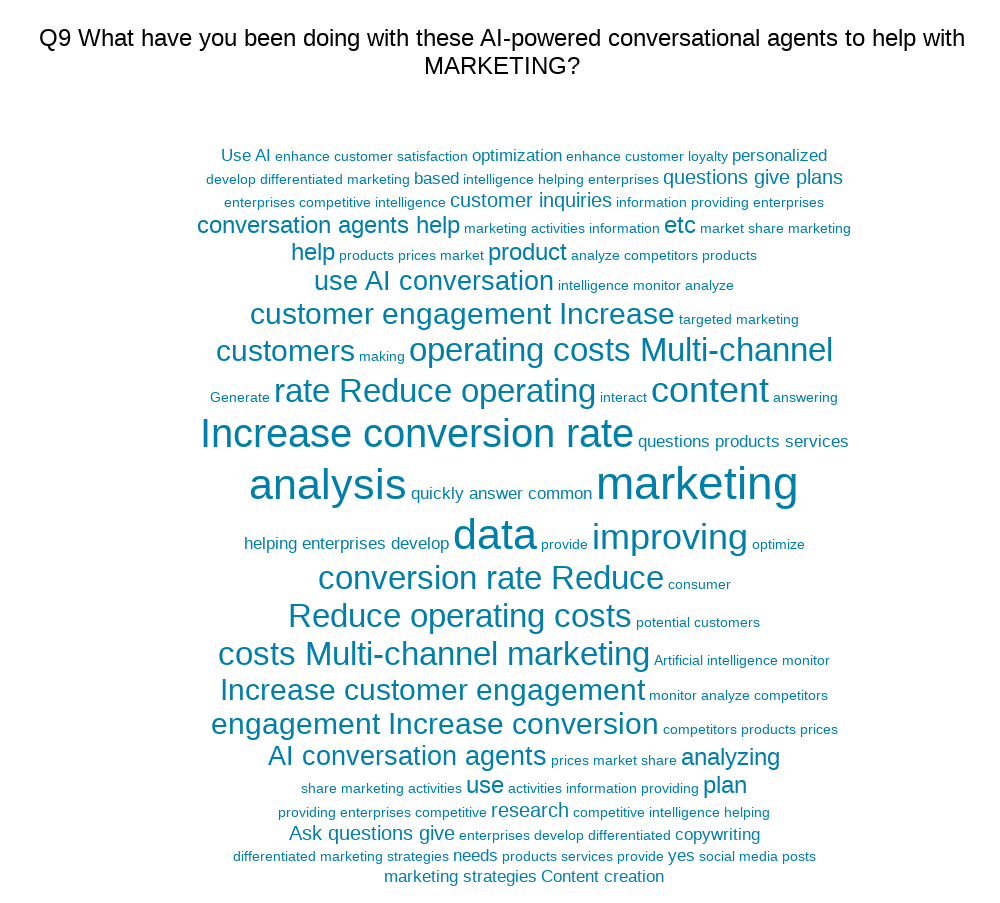
- Key Finding: Content creation, customer engagement, and analysis are the most common applications, with significant focus on increasing conversion rates and reducing operating costs.
Question 10: Additional AI Tools #

- Key Finding: Beyond conversational AI, tools like Jasper, DeepSeek, and video script generators are gaining traction, showing a diverse AI toolkit in marketing.
Question 11: AI Implementation Timeline #
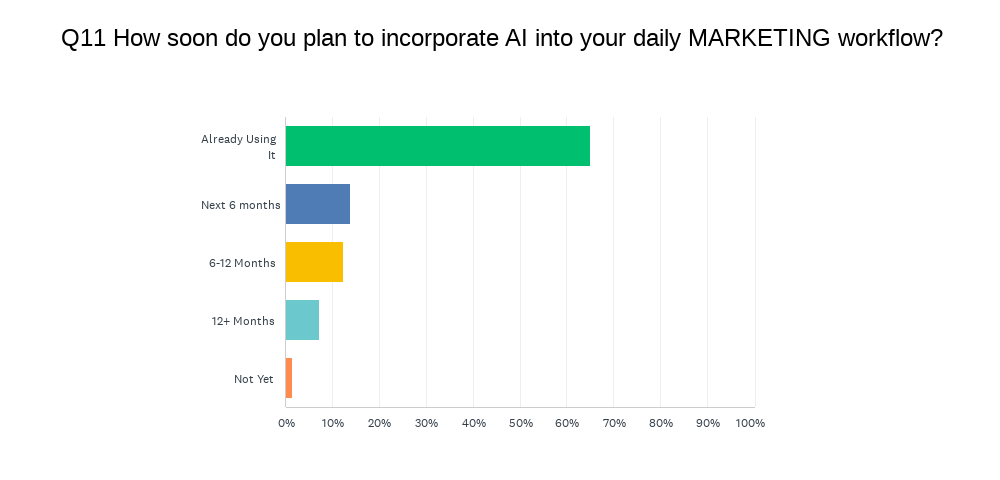
- Key Finding: 65% are already using AI, with 12% planning to adopt in the next 6 months, 13% in 6-12 months, 8% in 12+ months, and only 2% not yet planning adoption.
Question 12: AI Impact Perception #
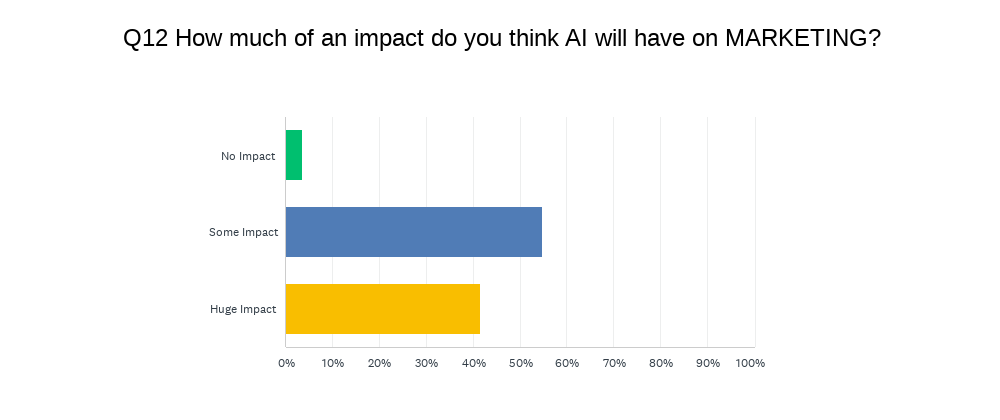
- Key Finding: 42% expect "Huge Impact," 55% expect "Some Impact," and only 3% expect "No Impact."
Question 13: Implementation Barriers #
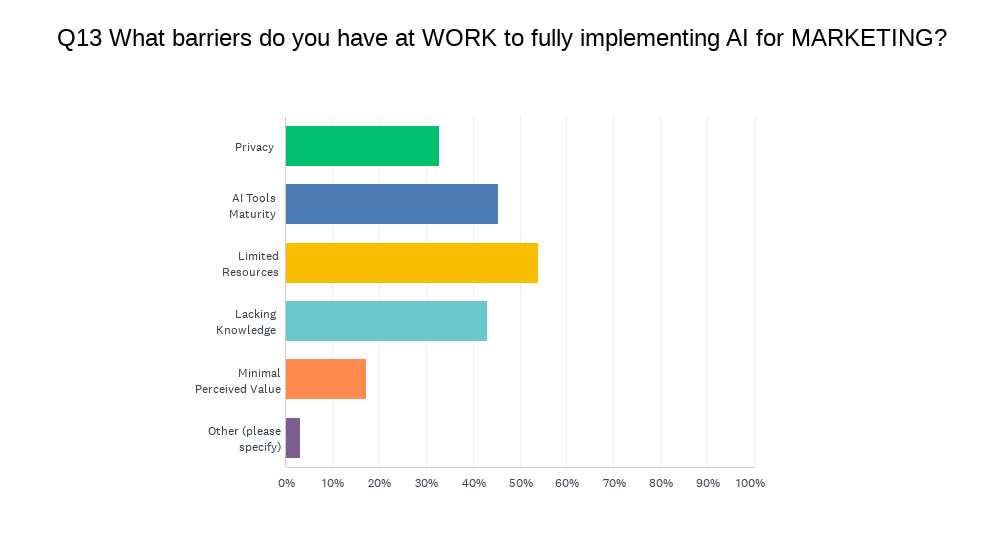
- Key Finding: Limited resources (50%) and AI tools maturity (48%) are the top barriers, followed by lacking knowledge (42%) and privacy concerns (32%).
Question 14: AI Benefits #
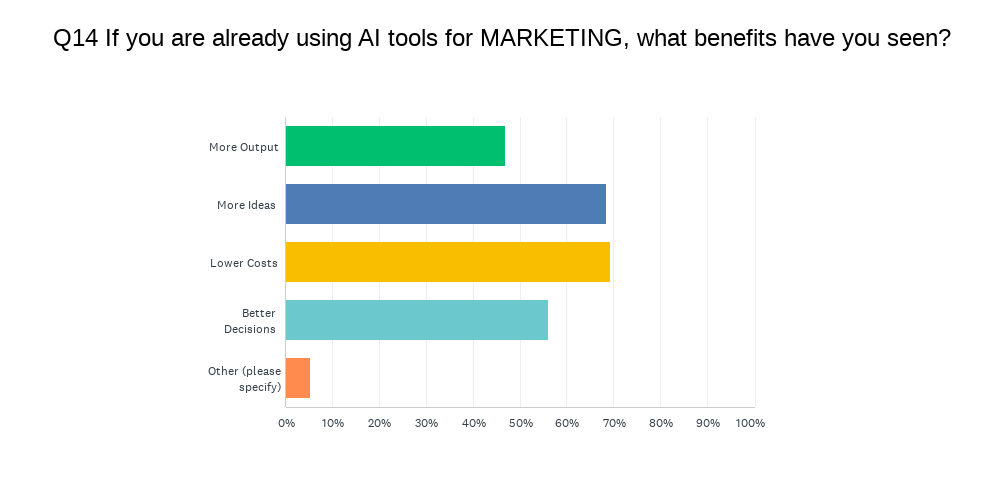
- Key Finding: Lower costs (70%) and more ideas (65%) are the top benefits, followed by better decisions (55%) and more output (50%).
Question 15: Valuable AI Capabilities #
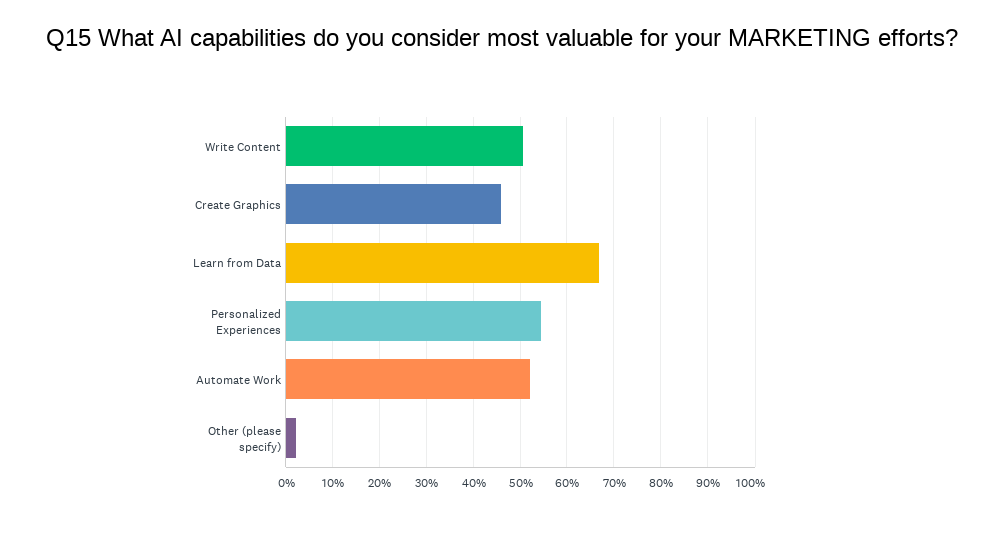
- Key Finding: Learning from data (68%) is most valuable, followed by automating work (55%), personalized experiences (52%), writing content (50%), and creating graphics (48%).
Question 16: AI Budget Support #
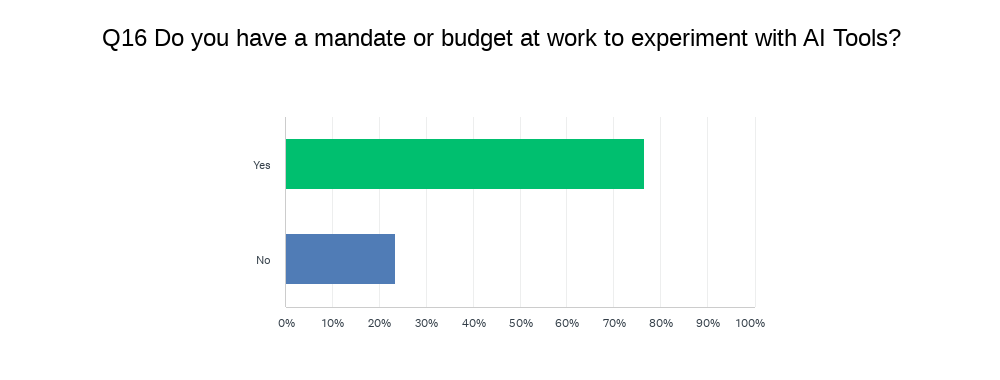
- Key Finding: 75% have a mandate or budget for AI experimentation, showing strong organizational support.
Question 17: AI Adoption Stage #
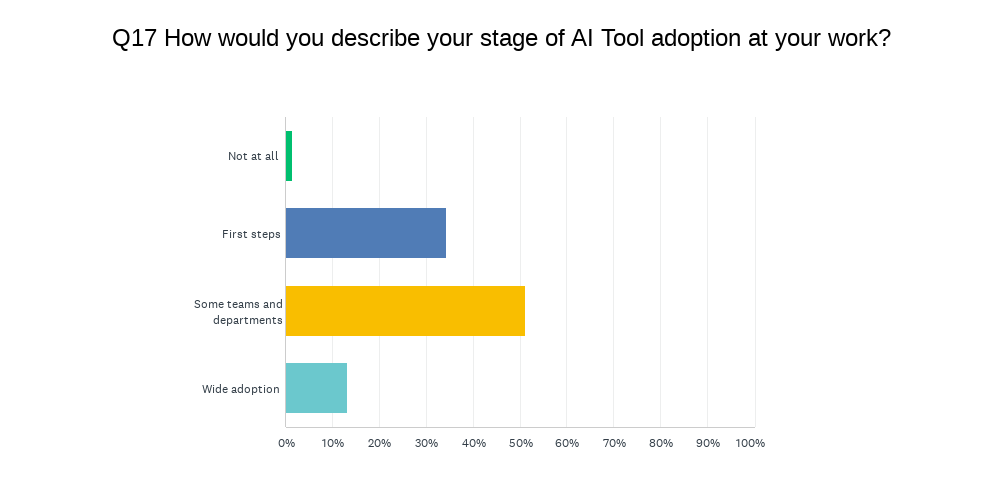
- Key Finding: 50% report adoption in some teams and departments, 33% are in first steps, 15% have wide adoption, and only 2% are not using AI at all.
Question 18: AI Impact by Marketing Area #
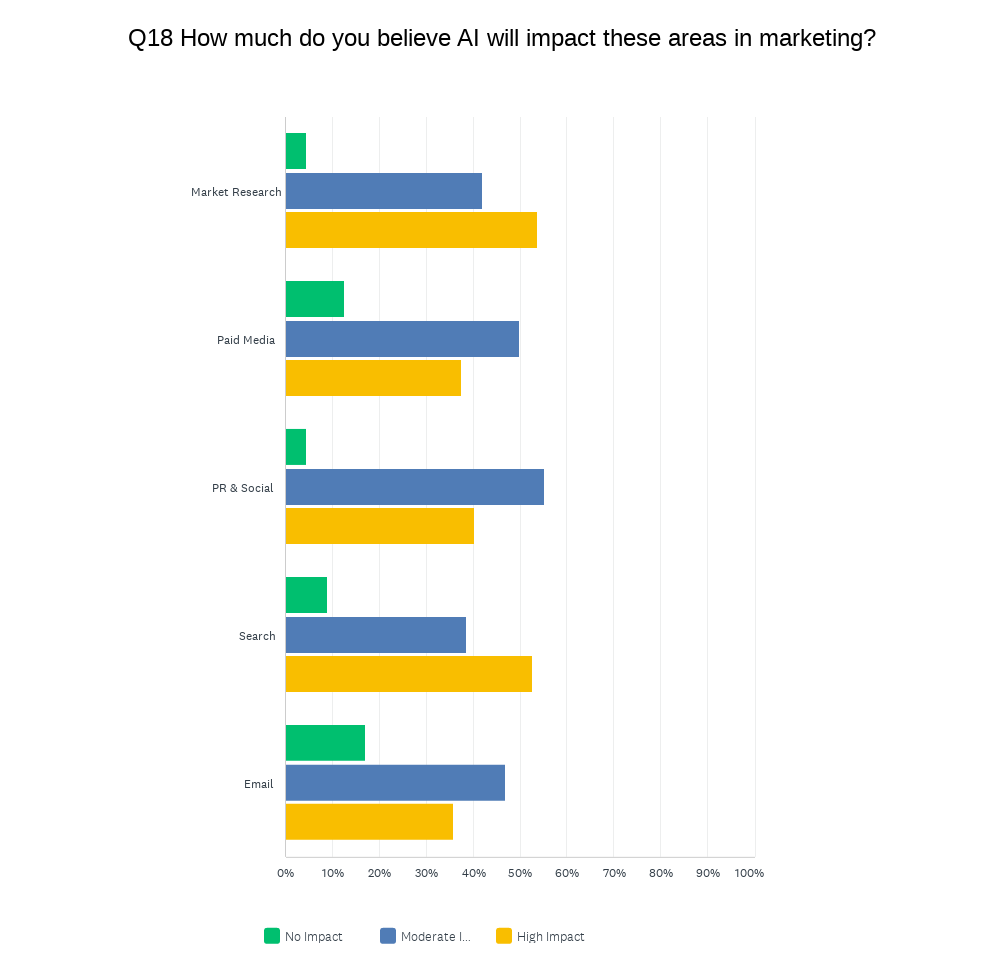
- Key Finding: Market research and search show the highest expected impact, with 50% predicting high impact in each area, followed by paid media (40%), email (40%), and PR & social (35%).
Question 19: AI Learning Sources #
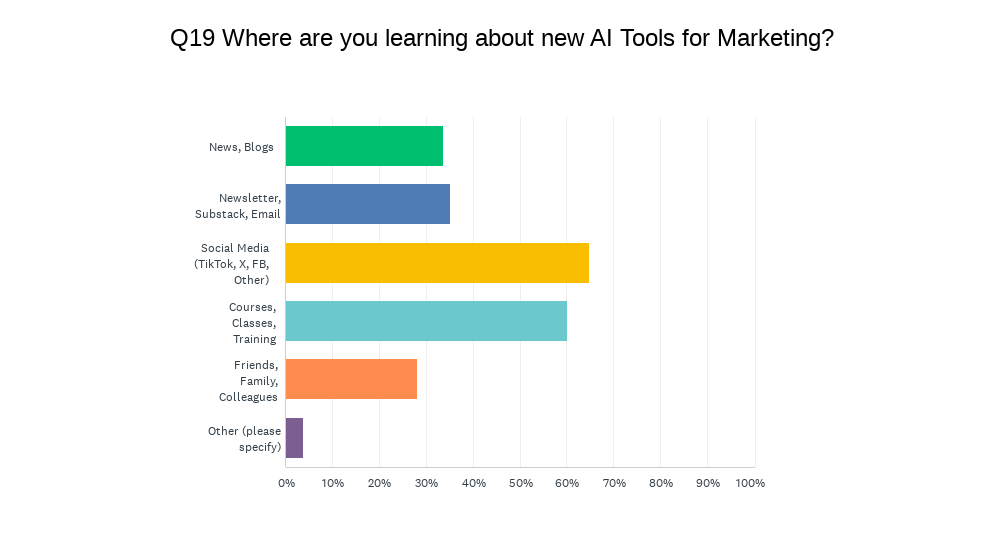
- Key Finding: Social media (65%) and courses/training (60%) are the top learning channels, followed by newsletters (45%), news/blogs (40%), and colleagues (30%).
Question 20: Trusted AI Sources #
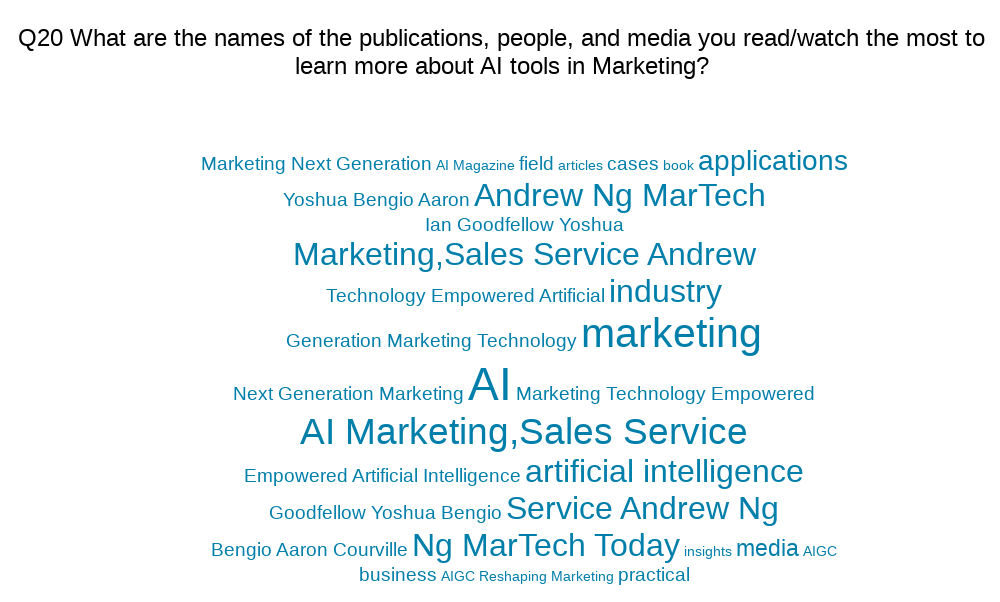
- Key Finding: Andrew Ng, MarTech, AI Magazine, and Substack emerge as the most trusted sources for AI knowledge.
Question 21: Personal Branding Responsibility #
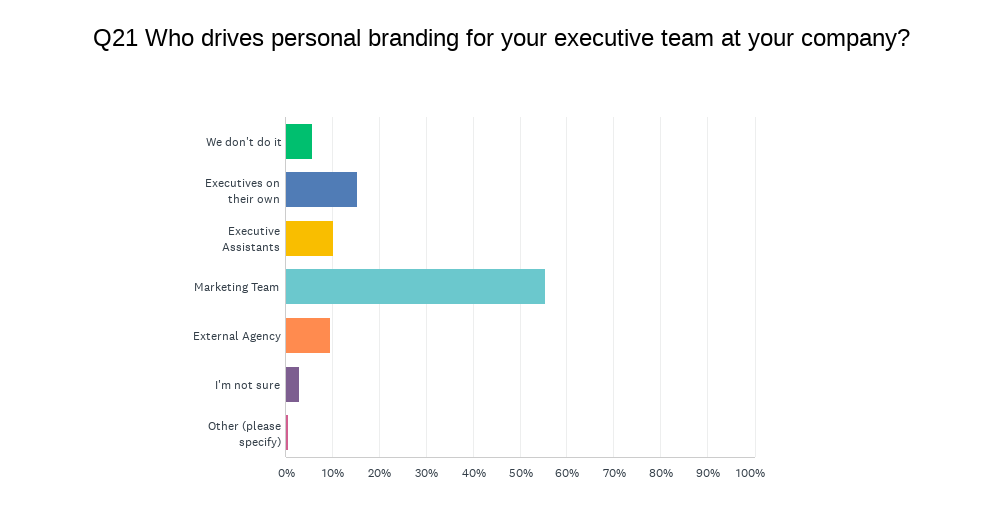
- Key Finding: Marketing teams lead personal branding (55%), followed by executives on their own (15%), executive assistants (10%), and external agencies (10%).
Question 22: Personal Branding Interest #

- Key Finding: 35% are "Very interested," 55% are "Somewhat interested," and 10% are "Not at all" interested in growing their personal brand.
Question 23: Personal Branding Actions #

- Key Finding: Social media, quality content, network expansion, and clear positioning are the most common actions taken to grow personal brands.
Next Steps #
The AI Marketing Survey 2025 reveals that AI is no longer optional—it's essential for modern marketing success. Whether you're just starting your AI journey or looking to scale your existing implementation, the time to act is now.
Ready to transform your marketing with AI? Start your 30-day free trial with Spark AI today. As our survey shows, the future of marketing is AI-driven—and with Spark AI, your future as a thought leader is now.
Survey Methodology: Research conducted February–March 2025, sampling 948 professionals across marketing (65%), sales (15%), product (12%), and other business functions (8%). Geographic distribution: United States (75%), Europe (15%), Asia-Pacific (7%), other regions (3%). Company sizes ranged from small businesses (30% with 1-50 employees), mid-sized companies (58% with 51-500 employees), to enterprise (12% with 501+ employees). Charts and data visualizations available above. Learn more at getsparkai.com.
Related Tools
Take your thought leadership to the next level with these free Spark AI tools:
- Thought Leadership Mini-Plan - Build a custom plan from your LinkedIn profile with AI.
- Explore All Free Tools - Discover more ways to amplify your voice.
